|
Printables |
PowerPoints |
Online exercises |
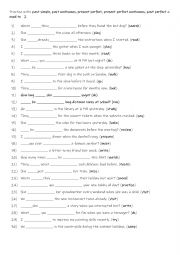
|
perfect, presenA2+-B1 Practise with past simple, past continuous, present t perfect continuous, past perfect & used to 2
Practising these tenses helps students express different aspects of time and actions effectively. The past simple is vital for describing completed actions, while the past continuous sets scenes or shows interruptions in the past. The present perfect connects past actions to the present, and the present perfect continuous highlights ongoing or repe...
Level: intermediate
Age: 9-100
Type:
Downloads: 113
|
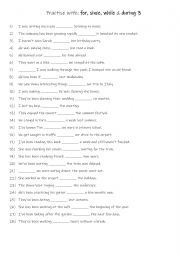
|
A2+-B1 Practise with for, since, while & during (3)
Learning to use for, since, during, and while is important because these words help student�s express time accurately in English, especially when talking about the duration and timing of events. For indicates the length of time an action takes place, while since pinpoints when an action started and continues until now, helping to show continuity. D...
Level: intermediate
Age: 9-100
Type:
Downloads: 100
|
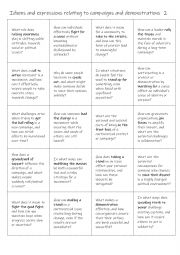
|
B1+-C1 Idioms and Expressions Relating to Campaigns and Demonstrations 2
This is a speaking reinforcement activity to supplement the other worksheet I uploaded on13/2/2025. Students working in pairs or small groups can either ask each other the questions or answer the question themselves.
Level: intermediate
Age: 12-100
Type:
Downloads: 110
|
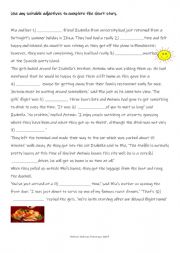
|
Short story with adjective gap fill
Students to read the story, then to complete the gaps with any suitable adjectives according to their meta language. This activity is suitable for A2-B1 students.
Level: elementary
Age: 10-100
Type:
Downloads: 281
|
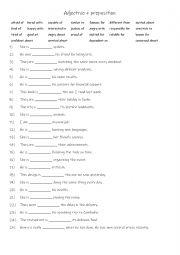
|
B1+ 25 Adjectives + prepositions
Learning these adjective-preposition combinations is essential because they are a fundamental part of everyday English communication. Native speakers often use these combinations to convey thoughts and emotions. Knowing them helps you sound more natural and fluent in English. These combinations allow you to express specific feelings, relationships,...
Level: intermediate
Age: 10-100
Type:
Downloads: 104
|
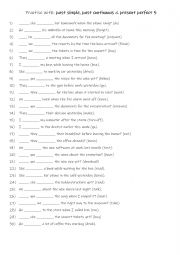
|
A1+ A2 Practise with past simple, past continuous & present perfect 5
First, students need to familiarise themselves with the 3 tenses and their use. Then they read the sentences to work out which one is needed to complete the gap-fill using the given verb in (). Each tense is used 9 times! Answers on page 2
Level: elementary
Age: 7-100
Type:
Downloads: 138
|
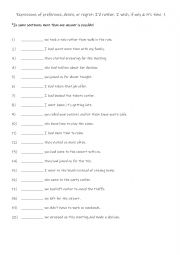
|
Expressions of preference, desire, or regret I�d rather, I wish, if only & it�s time 1
Students should learn expressions of preference, desire, or regret like "I�d rather," "I wish," "If only," and "It�s time" because they help them communicate personal feelings, make choices, and reflect on past experiences or future possibilities in English. These phrases allow students to express what they want, what they regret, or what they feel...
Level: intermediate
Age: 10-100
Type:
Downloads: 105
|
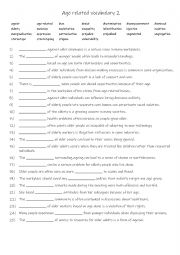
|
B1+-C1 Age related vocabulary 3
First, students need to familiarise themselves with the 25 words and their meanings Then they read the definitions to see which one is being described and write that word in the space provided. Answers on page 2.
Level: intermediate
Age: 12-100
Type: worksheet
Downloads: 114
|
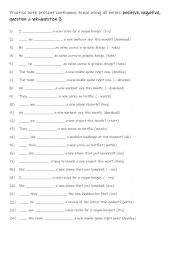
|
A1-A1+ Practise with present continuous tense using all forms positive, negative, question & wh-question 3
Each form is used 6 times! Answers on page 2.
Level: elementary
Age: 7-100
Type:
Downloads: 131
|
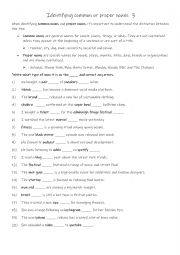
|
Identifying common or proper nouns 3
First, students need to familiarise themselves with the 2 types of nouns. Then they read the sentences to identify and use the correct punctuation for all of the sentences. Answers on page 2
Level: elementary
Age: 8-100
Type:
Downloads: 111
|
|
|
|
|












